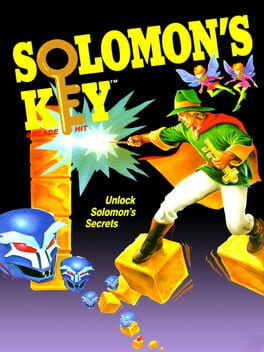There is some undeniable wit in its very own premise of being able to create and destroy (part of) the map at will as a puzzle solver tool, however, the strength of the premise never finds a worthy match in the design of any level.
Sure, there are enough smart elements to carry the game, but as the levels are formed into puzzle boxes they are underwhelming, with solutions usually taking about 3 or 4 not that clever steps to clear and few rearrangements of expectations within the given rules, more often than not, it feels like it has nothing to twist even. The worries of not being competent in following the premise intelligence are confirmed by the addition of the action elements.
If the puzzle game is well thought out at its premise, the same cannot be said about the action. At best, it will give a few surprises through exploration or luck, but it will often feel as a detriment in the way to make the game look more interesting. Sure, it's important to add a timer to twist a bit more what a possible solution can be, but, apart from that, action usually will mean just a mere transit (regardless of its difficulty to execute) between solving a level and discovering a new one. It seems even more clear looking at how the levels are thought out in a very tight tile distribution, and realizing that the time limit is just a real time, and less intellectually interesting, number of movements limit.
To envision Solomon's Key as a pure puzzle game is not only possible but a revelation that there might have been a better similar game and that the level design always falls behind what the premise suggests. Thinking about Solomon's Key as an action game, it’s just too stiff to stand on its own, even the jump, the only action with some uncertain momentum, is an easy tile distance calculation. And I’m afraid most of the time will be spent dealing with the latter type of game.
Sure, there are enough smart elements to carry the game, but as the levels are formed into puzzle boxes they are underwhelming, with solutions usually taking about 3 or 4 not that clever steps to clear and few rearrangements of expectations within the given rules, more often than not, it feels like it has nothing to twist even. The worries of not being competent in following the premise intelligence are confirmed by the addition of the action elements.
If the puzzle game is well thought out at its premise, the same cannot be said about the action. At best, it will give a few surprises through exploration or luck, but it will often feel as a detriment in the way to make the game look more interesting. Sure, it's important to add a timer to twist a bit more what a possible solution can be, but, apart from that, action usually will mean just a mere transit (regardless of its difficulty to execute) between solving a level and discovering a new one. It seems even more clear looking at how the levels are thought out in a very tight tile distribution, and realizing that the time limit is just a real time, and less intellectually interesting, number of movements limit.
To envision Solomon's Key as a pure puzzle game is not only possible but a revelation that there might have been a better similar game and that the level design always falls behind what the premise suggests. Thinking about Solomon's Key as an action game, it’s just too stiff to stand on its own, even the jump, the only action with some uncertain momentum, is an easy tile distance calculation. And I’m afraid most of the time will be spent dealing with the latter type of game.
